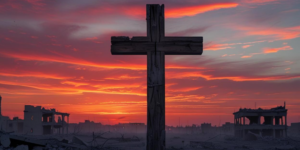Why the Gay Agenda Is Attacking Ex-Homosexual Donnie McClurkin
Donnie McClurkin was invited to perform at the 50th anniversary of the civil rights movement in Washington, D.C. This event was a government-sponsored concert with other singers at the Martin Luther King Jr. Memorial on Saturday evening. But after the gay rights activists got wind of his participation, the fight was on to disinvite the Grammy Award-winning singer from this amazing event. Mayor Vincent C. Gray’s office asked him not to attend the concert where he was considered a headliner.
Why? Because gospel singer Donnie McClurkin has said God delivered him from “the curse” of homosexuality.
How can you disinvite a black man from attending the 50th anniversary of the civil rights movement? Let’s get one thing straight, people: Homosexuality is not a civil rights issue!
Is Homosexuality a Civil Rights Issue?
Homosexuality is not a civil rights issue. I am black. I became a lesbian. They are not the same.
I did not choose the color of my skin. I did choose to enter a lesbian relationship and to live a homosexual lifestyle for 14 years. I also chose to leave that lifestyle, but I cannot choose to stop being black. There is a difference. The color of my skin is an immutable quality of my being while my lesbianism was a deliberate series of actions resulting in a lifestyle choice.
It is a mockery to everything the black community suffered and the rights we fought for to claim that homosexuality is a civil rights issue. There is simply no comparison. Gays and lesbians have never been forced to ride at the back of the bus or to eat at separate restaurants. They didn’t attend separate schools. They have never been made slaves or been considered by law as less than human. The African-American church needs to stand up for itself on this issue, because even though I am a former lesbian, as an African-American I am insulted that the homosexual community would even attempt to compare gay rights to civil rights.
A homosexual has the same rights that a heterosexual person has. Every single right is exactly the same. They have the right to vote and be counted not as three-fifths of a person but as a whole person. They have the right to own property, and they also have the right not to be property. They have the right to learn to read and to obtain an education. They have the right to eat at any restaurant, shop at any store and enter any public place they wish. They have the right to cross state lines without fear of being hunted, beaten and imprisoned. They have the right to let their voices be heard without being lynched. These are all rights blacks had to fight for through hundreds of years of struggle, but homosexuals do not deal with any of these civil rights issues.
Again, there is absolutely no comparison. Gay rights activists will cite the tragic and gruesome death of Matthew Shepard, which was wrong in every sense of the word. However, Shepard’s death was an isolated incident and by no means represents either the treatment of or the sentiment toward homosexuals in the United States. His death is but a drop when compared against the ocean of atrocities committed against blacks during slavery and segregation.
Even now, so-called homophobia pales in comparison to racism. Homosexuals are not routinely pulled over by police at a higher rate than heterosexuals. Neighbors will not complain about a gay couple living next door decreasing the value of the houses in their neighborhood. Very few people will become frightened if approached by a homosexual on the street. Employment and educational opportunities as well as standards of living are much higher for homosexuals than they are for blacks.
Blacks cannot hide their blackness; it is apparent to everyone who sees them. However, not everyone who looks at a homosexual will be able to determine their sexual orientation. The difference between black skin and homosexuality is that black skin is a physical characteristic while homosexuality is a behavior.
Put simply, there is no civil rights struggle for homosexuals. While there is some validity to claims of discrimination based on sexual orientation, it has been blown far out of proportion. I have suffered far more discrimination being a black woman than I ever did for being a butch lesbian. Many claims of homophobia are intended to create a victim mentality within the homosexual community and a belief that homosexuals are being oppressed in society at large. This tactic has played well in media circles and in political arenas and has gained many supporters for the normalization of the homosexual lifestyle and the campaign for same-sex marriage. However, the desire for the legitimization of a lifestyle does not equal a struggle for existence and equal rights. Homosexual rights are not, nor should they be considered, a civil rights struggle.
In October 2005, I lobbied in Washington, D.C., against a hate crimes bill that was trying to make its way through the Senate and House. If it had been signed into law, the bill, S. 1145, would have expanded the legal definition of a minority group to include groups that share a similar behavior, with sexual orientation being an example of shared behavior. By painting such a broad definition of a minority group, the legislation would have made the term meaningless. If a behavior such as sexual orientation makes a community a minority group, then any group that exhibits similar behavior could qualify. It is conceivable that any person could make a claim to belonging to a minority group based on shared behavior with as little as one other individual. Crimes against a minority group count as a hate crime, the conviction of which carries an increased judicial sentence by law.
S. 1145 also claimed that in expanding the definition of a minority group, it would erase the memory of slavery. Such a claim is as ridiculous as it is foolish. The very idea that the memory of slavery would, could or should be erased is a slap in the face of every black person living in the United States. If we erased the memory of slavery, we would erase the proud history of the civil rights movement, we would erase the uniqueness of black culture, and we might doom ourselves to repeat the sins and tragedies of the past.
Hate crime bills that attempt to legally associate sexual orientation with race are but another attempt to promote the false idea that there is a homosexual civil rights movement. S. 1145 failed, as have many other bills of the same type, but I don’t doubt that similar bills will be tried in the future.
As a member of the black community, I believe it is time for us to stand up for ourselves and our heritage. Black churches may be ignoring homosexuality more than any other group of Christians, if simply because we don’t want to admit it could happen in our families and in our churches. While it is important for us to minister and reach out to individuals struggling with homosexuality, we also need to stand against the progression of homosexuality in our society, and that is a message the black church and community can vocalize. I want to encourage every black person reading this to make it known to senators, to churches and to society that trying to make homosexuality seem normal is not and never will be the same thing as our long and hard struggle for civil rights.
The color of my skin is something I cannot alter, but God’s gentle call and His love changed my life. His love was reflected through the obedience of a woman in a grocery store, a women’s Bible study and a family willing to take me into their home.
I want to encourage churches, both black and white, to come together to send out a consistent message about homosexuality, one that speaks and acts in love while not compromising values or becoming accepting of sin. This we can do by making our own hearts and lives right with God and then by following the Holy Spirit’s direction by ministering to those who struggle with homosexuality. I truly believe that what God has done in my life, He can do in the lives of all who call on His name.
Let’s stop hiding our heads in the sand; this is no time to play peek-a-boo!
As Donnie said, he was “delivered from homosexuality,” and there are many more of us like him around the country that have left the life of homosexuality. They talk about equality, but how about treating those who have chosen to walk out of this lifestyle with respect as well?
The Bible says in Leviticus 18:22, “Do not practice homosexuality, having sex with another man as with a woman. It is a detestable sin” (NLT).
Leviticus 20:13 says, “And if a man lie with mankind, as with womankind, both of them have committed abomination: they shall surely be put to death; their blood shall be upon them” (ASV).
1 Corithians 6:9-10 says, “Don’t you realize that those who do wrong will not inherit the Kingdom of God? Don’t fool yourselves. Those who indulge in sexual sin, or who worship idols, or commit adultery, or are male prostitutes, or practice homosexuality, or are thieves, or greedy people, or drunkards, or are abusive, or cheat people—none of these will inherit the Kingdom of God” (NLT).
Yes, I am aware that is not the only sin the Bible speaks of; however, it’s one sin we are being asked to celebrate, and therefore it needs to be addressed.
What happened to free speech? Oh, that’s right! Free speech is only for the gay community. Free speech is not for those of us who speak about the redemptive love of God who has compelled us to walk away from that lifestyle! If we voice our opinion, the gay community behaves as a big bully and discriminates against us because we don’t share their views. Gay activists want us to shut up and go away. That will not happen! They feel that I, along with many others who have left homosexuality, were more valuable living as homosexuals than we were once we came out. If the gay community is so happy with themselves, why do they feel threated by our testimonies?
Church, we must continue to make a stand. Let me share this last excerpt from my book Called Out, addressed to the church:
Our loss of focus on Christ has caused the church to be caught by surprise in a number of ways as we suddenly find our beliefs and our actions becoming more like the rest of the world. Although there are many areas in which we have failed to guard against this, one such area that has crept up on us is the growing issue of homosexuality.
As homosexuality has become more common, Christians have struggled with how they should respond. Some have taken to the streets in protest, proclaiming that God hates fags. Others have openly embraced homosexuality, allowing gays and lesbians into the pulpit and leadership positions in their churches. And, overwhelmingly, most Christians are simply trying to ignore homosexuality, hoping they can wait out the issue until it goes away because they don’t want to deal with conflict or sin.
Dear church, we can be apathetic no longer. We cannot ignore homosexuality. The homosexual community is small, but it isn’t going away. Instead, it has become a vocal and influential part of our society. The church has been responding to homosexuals and homosexuality with mixed signals, but now we must speak with one voice and act. We must speak and act with God’s love.
But how?
The Bible clearly states homosexuality is a sin. Those who try to explain away the Scriptures dealing with homosexuality as being culturally and morally outdated are growing in number, but they are wrong. Parts of the Bible cannot be ignored or taken out simply because they tell us things we don’t want to hear. When I was living in homosexuality, I knew I was sinning. The Bible told me, my conscience told me and many people in my life told me. Unfortunately, I also had many people telling me what I was doing was simply a lifestyle choice and not a sin—people including the priest Haley and I went to for counseling. As Christians, we cannot make excuses for sin—any sin.
We must make a stand for righteousness and purity. It must begin in our own lives and be demonstrated by the church as a whole, by everyone from pulpit to pew. We must set an example by the way we live our lives or we will have no moral authority to lead others. There must be a concentrated effort to renew the family life by preaching and practicing abstinence until marriage, marriage for life and stronger parental involvement in the lives of children.
Janet Boynes is the founder of Janet Boynes Ministries, a nondenominational outreach that ministers to individuals questioning their sexuality and those who wish to leave homosexuality. As the author of Called Out, Boynes chronicles her story of living as a lesbian for 14 years until God called her out of that lifestyle.







































